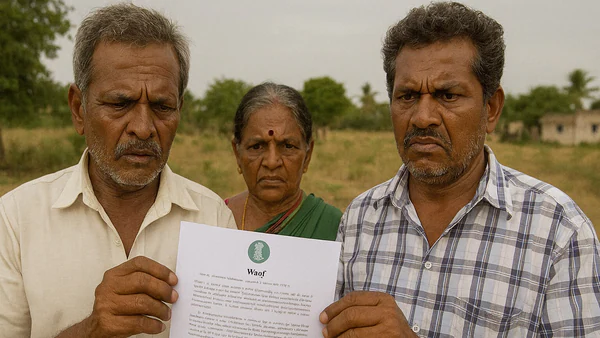
'Pay Rent Or Vacate': Tamil Nadu Villagers Allege Their Lands Suddenly Declared 'Waqf' Property By Local Mosque
The Waqf property notices reportedly demand residents either pay rent or vacate the land, leading to widespread anxiety among approximately 150 families who have lived in the village for three to four generations.
The villagers have petitioned Vellore District Collector V R Subbulaxmi, seeking intervention and justice. The residents of Kaatukollai village under Anaikattu union (Vellore district), near Virinichipuram said they have been living in the village for about 3-4 generations and now, all of a sudden, they have received notices.
However, officials have not responded to calls for comment, and the content of the notices could not be independently verified.
Also Read | India slams Pakistan over 'motivated and baseless' remark on Waqf Law Murshidabad Violence Over Waqf ActIn West Bengal's Murshidabad district, violent clashes erupted between protesters and police from April 8 to April 13, leaving three dead and ten injured. Demonstrators blocked National Highway 12, vandalised vehicles, and disrupted train services at Nimtita railway station.
The violence escalated further with attacks on private residences and the office of Trinamool Congress MP Khalilur Rahman. Over 200 arrests were made as authorities imposed Section 144 and suspended internet services to restore order.
Also Read | CM Adityanath suggests 'Danda treatment' for Waqf rioters in Murshidabad What is the Waqf Act?The Waqf Act governs the administration of Waqf properties-endowments made for religious or charitable purposes under Islamic law. The recent amendment has sparked controversy by expanding government oversight and redefining property classifications, which critics claim infringes on community autonomy.
Also Read | West Bengal violence: Fresh clashes reported in Bhangar, 8 cops injuredProvisions allowing authorities to declare land as Waqf property without prior consultation have led to widespread protests, especially in minority-dominated regions.
While proponents argue that the amendment ensures better management of Waqf assets, detractors view it as an overreach that risks alienating affected communities. Critics argue that the amended Act centralises control over Waqf properties, leading to disputes over land ownership and minority rights.
Legal Disclaimer:
MENAFN provides the
information “as is” without warranty of any kind. We do not accept
any responsibility or liability for the accuracy, content, images,
videos, licenses, completeness, legality, or reliability of the information
contained in this article. If you have any complaints or copyright
issues related to this article, kindly contact the provider above.


















Comments
No comment